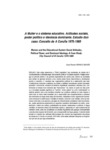Mostrar o rexistro simple do ítem
A muller e o sistema educativo. Actitudes sociais, poder político e ideoloxía dominante. Estudio dun caso: Concello de A Coruña 1970-1985
| dc.contributor.author | Branco Buxán, Xosé Ramón | |
| dc.date.accessioned | 2011-07-12T11:56:50Z | |
| dc.date.available | 2011-07-12T11:56:50Z | |
| dc.date.issued | 2009 | |
| dc.identifier.citation | Sarmiento Anuario galego de historia da educación, 2009, 13: 101-130. ISSN: 1138-5863 | es_ES |
| dc.identifier.issn | 1138-5863 | |
| dc.identifier.uri | http://hdl.handle.net/2183/7843 | |
| dc.description.abstract | [Resumo] Este artigo desenvolve o “Perfil Lingüístico” dos ensinantes da cidade de A Coruña durante a chamada etapa “da transición política” no Estado español. A etapa abran- gue un período político e de grandes expectativas de cambio pola maioría da sociedade pero tamén de grandes temores a ese cambio polas forzas hexemónicas e dominantes (acción e reacción). O resultado das negociacións políticas foi a elaboración dun texto Constitucional chamado a satisfacer as moitas e distintas necesidades sociais (liberdade, expresión, convivencia, estrutura do territorio, lingüisticas, educativas, relixiosas, etc), con- formando un Estado novo chamado das “Autonomías”. Se, desde un punto de vista políti- co, o resultado acadado significou un “cambio”, “unha ruptura” ou unha “continuidade” co sistema anterior será unha temática presente nas prácticas politicas do hoxe mesmo e sobre todo no futuro máis inmediato; así a observación dos comportamentos e actitudes dos ensinantes ao longo desta etapa de transición, estudiados nunha organización escolar: como estruturan e reestruturan o traballo os mestres, como fan o seu traballo, como se rela- cionan entre eles e cos alumnos, que tipos de coñecementos consideran máis importantes, etc., poden aportarnos explicacións ás seguintes cuestións: feminización do ensino, prole- terización, control nos centros, posibilidades de cambio, resistencias e conflictos. A lingua constitúe un elemento básico de identidade cultural e representa un valor fundamental de cohesión social; unha vez acreditados os dereitos lingüísticos dos galegos correspóndelle a escola crear espazos de formación, uso e recuperación da lingua galega. O obxecto deste traballo é o estudio das actitudes diferenciadas das mestras nas organización educativas da cidade de A Coruña no período 1970/1985, entre estas actitudes atópanse as lingüísti- cas que son ás que aquí presentamos. | es_ES |
| dc.description.abstract | [Abstract] This article examines the “Linguistic profile” of teachers in the city of A Coruña during the period known as the “political transition” in Spain. The time frame covers a political period that filled the society at large with great expectations for change, but they were also extremely fearful of this change owing to the the dominant hegemonic forces (action and reaction). The outcome of the political negotiations was a Constitutional text aimed at mee- ting the many, different social needs (liberty, freedom of speech, harmony, territorial structu- ring, linguistics, education, religion, etc.), comprising a new Nation of Autonomous Communities. If, from a political standpoint, the result achieved was interpreted as a “chan- ge”, a “break” or a “continuity” as regards the previous system, it is also a theme that is still present in today’s political practices, and particularly in the near future. Hence the observa- tion of the behavior and attitude of teachers over the course of this transition period is exami- ned in a school environment: how teachers structure and restructure their work, how they carry out their work, how they interact with each other and with the students, what kind of knowledge they consider to be most important, etc. All of this information can provide us with answers to the following questions: the feminization of education, proletarianiization, control in the schools, possibilities for change, resistance and conflict. Language is a basic element of our cultural identity and it represents a fundamental value of social cohesion. Once the lin- guistic rights of the Galician people have been established, it is up to the schools to create spaces for the instruction, use and recuperation of the Galician language. The purpose of this paper is to study the different attiudes of teachers in educational organizations in the city of A Coruña from 1970-1985. Among these attitudes we find the linguistics presented here. | es_ES |
| dc.language.iso | glg | es_ES |
| dc.publisher | Universidade da Coruña | es_ES |
| dc.subject | Lingua | es_ES |
| dc.subject | Feminización | es_ES |
| dc.subject | Usos lingüísticos | es_ES |
| dc.subject | Diglosia | es_ES |
| dc.subject | Glotofaxia | es_ES |
| dc.subject | Bilingüismo | es_ES |
| dc.subject | Conflitos | es_ES |
| dc.subject | Language | es_ES |
| dc.subject | Linguistic uses | es_ES |
| dc.subject | Diglossia | es_ES |
| dc.subject | Glottophagy | es_ES |
| dc.subject | Bilinguism | es_ES |
| dc.subject | Conflicts | es_ES |
| dc.title | A muller e o sistema educativo. Actitudes sociais, poder político e ideoloxía dominante. Estudio dun caso: Concello de A Coruña 1970-1985 | es_ES |
| dc.type | info:eu-repo/semantics/article | es_ES |
| dc.rights.access | info:eu-repo/semantics/openAccess |






